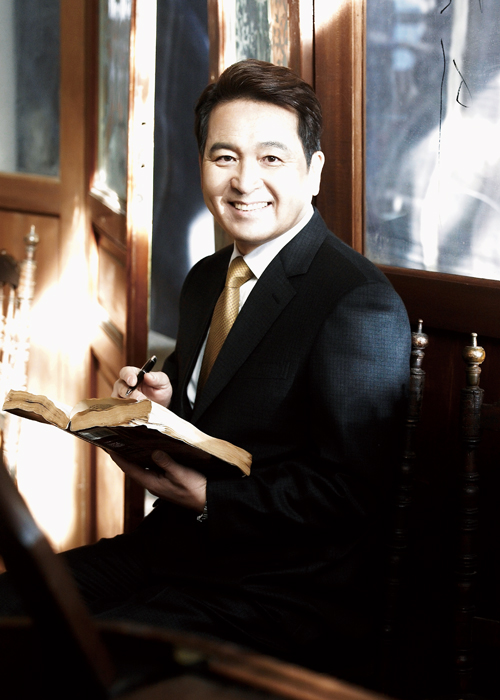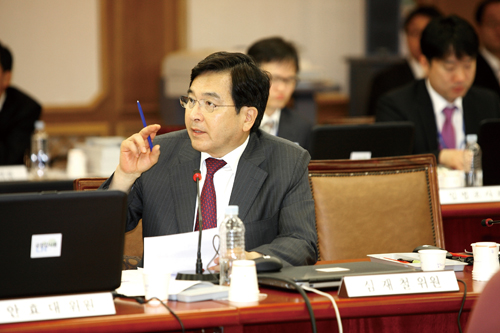Rep. Shim seen as one of the most active and exemplary parliamentarians among ruling and opposition parties

Rep. Shim Jae-chul, a member of the Supreme Council of the ruling Saenuri Party
Rep. Shim, a journalist-turned lawmaker, is well known as an outspoken critic of the government with a mandate to ensure a balanced government as the voice of the people. The Saenuri Party proposed its top six political reform plans of the 19th National Assembly, four of which coincided with Rep. Shim’s public pledges for reforming the political arena. The party’s four reform measures, including renouncing the privilege to not be arrested, and the application of a no labor, no wage system — three of which were also advocated by Rep. Shim — were approved by the National Assembly and put into force.
For instance, Rep. Shim spearheaded the ruling party’s members’ campaign to return their first extra pay in accordance with the application of a no labor, no pay system for failing to open the newly inaugurated parliament due to the opposition’s boycott, so 99 percent of the Saenuri lawmakers participated in the drive. He joined 28 Saenuri lawmakers in a similar drive for a failure to open the 18th National Assembly on time. Rep. Shim returned his extra pay for the similar cause while working as the freshman lawmaker and donated the money as a fund for repairing damages caused by a massive brushfire in Goseong, Gangwon-do, in 2000.
Rep. Shim, also chairman of the Gyeongil Forum, stressed the need for nurturing the tourism industry, which has seen new employment jump an annual average of 9.8 percent in the recent three years, a 10-fold surge compared to the nation’s annual overall job creation growth rate of 0.9 percent. “The Gyeongil Forum advocates openness and creativity in the tourism industry as well as a dramatic relaxation of regulations to successfully translate into action a national agenda of building the creative economy,” he said. The following are excerpts of an interview between NewsWorld and Rep. Shim in which he spoke of his priority parliamentary activities.

Rep. Shim is well known as an outspoken critic of the government with
a mandate to ensure a balanced government as the voice of the people.
Question: Will you tell our readers about the operation of the Gyeongil Forum?
Answer: The Gyeongil Forum, named after Korean acronyms of the Korean words “Economy Resuscitation and Job Creation Forum,” was founded on Oct. 11, 2013 with the goal of creating jobs by diagnosing the current economic situation and suggesting solutions. I chair the forum, whose overall operation and research are headed by Rep. Kim Yong-tae and Rep. Lee Man-woo, both of the Saenuri Party.
The Korean tourism industry has maintained a huge growth rate with the number of foreign arrivals reaching 11.14 million as of the end of last year, but it ranked 23rd in the world and sixth in Asia. There are lots of tasks such as improving the low-wage system for employees in the tourism industry, Airbnb for transferring idle manpower into self-employed businesspersons, and medical tourism and the cruise industry to be utilized to nourish the tourism industry. In this regard, we at the Gyeongil Forum try to spread public consensus on the legal foundation by revising related laws including the Act on the Promotion of the Tourism Industry.
The tourism industry has seen its new employment jump an annual average of 9.8 percent in the recent three years, a 10-fold surge compared to the nation’s annual overall job creation growth rate of 0.9 percent. The Gyeongil Forum advocates openness and creative tourism as well as dramatic relaxation of regulations to successfully translate into action a national agenda of building the creative economy.
Q: Will you elaborate on parliamentary activities you have been conducting as a four-term lawmaker in the 19th National Assembly?
A: The parliament approved during its plenary session held on Dec. 12 a measure to revise the Act on Housing, calling for allowing vertical expansion while remodeling apartment units. The revision stipulates the permission of adding three upward floors to the existing apartments, aged 15 years or more or increasing the number of households by 15 percent. In my constituency in Anyang, some 60,000 households live in decrepit apartments, aged 15 years or more. When the amendment goes into effect next April, it will likely facilitate the remodeling of 15 year-old or more apartments, thus offering the residents a better housing environment. I’ve been engaged in active parliamentary activities, as with my leading roles in proposing the amendment of the Act on Housing and other revision bills, including the one on preventing those found to be involved in illegal practices during party nomination competitions from becoming candidates and the nullifying and expelling of proportional representation candidates proved to be involved in such wrongdoings.
I’ve proposed numerous other amendment measures. They include a revision bill of the Medical Act for punishing those who violate a ban on the reuse of disposal medical devices; a measure to revise the Act on the Protection of Juveniles; a revision of the Act on the Registration of Lending Businesses and the Protection of Finance Users for restricting the airing of advertisements for lending businesses during typical youth television viewing hours and protecting finance users from misleading advertisements; and a revision of the Medical Act, calling for allowing medical doctors to send prescriptions and medical information via telemedicine to those patients who are isolated in remote areas or cannot move freely and are suffering from such chronic diseases as hyperpiesia.
Q: Will you comment on your parliamentary activities related to the development and innovation of your constituency?
A: I have attached top priority to a project to build a double-track, electrified railway connecting Indeokwon and Dongtan because traffic, which is closely related to housing welfare, has emerged as the most pressing issue of modern society. The Anyang area covering Gunpo and Uiwang have a population of more than 1 million people, but a majority of the residents commute to Seoul to go to school and work, so the Indeokwon-Dongtan section of the electrified railway is essential for the residents commuting to Seoul. I’m devoting myself to having the project reflected in next year’s budget and have it built by 2019. I’ve also been holding meetings with ranking officials from the Ministry of Strategy and Finance and the Ministry of Land, Infrastructure and Transport to discuss a plan to install a new electrified railroad station at Hogae Intersection in my constituency.
I’m also paying a keen attention to education since I once did a stint as an English teacher at Dongdaemun Girls’ High School before switching careers to become a reporter at MBC Broadcasting Network. My focus is on improving school facilities in my constituency of Anyang, an educational city. So far, 10 school auditoriums and gymnasiums have been rebuilt or remodeled with budgets I played a leading role in securing. I’m committed to building study rooms and expanding libraries. About 300 million won has been spent to establish study rooms at the Hogye 1-dong Residents’ Center, and the new multiplex building for accommodating the Hogae 3-dong Administrative Office, which is now under construction, will have a library. A structure once used as the Pyeongchon-dong Residents’ Center will be remodeled into a library. Among my additional activities related to education are the designation of Anyang as a lifelong education city, arranging students’ English study programs in the United States, the installation of CCTVs, and eight other safety facilities in the neighborhood of schools.

Rep. Shim Jae-chul, a member of the National Assembly Land, Infrastructure and Transport Committee,
speaks at a recent parliamentary interpellation of the government. (photos: Rep. Shim Jae-chul’s Office)
Q: Will you comment on ways of developing the Korean railroad industry as a member of the National Assembly, Land, Infrastructure and Transport Committee?
A: I favor the efficient operation of Korea Railroad Corp. (KORAIL) based on specialization, as with a German-type holding-company-subsidiary structure. I suggest a shift into a structure in which KORAIL serves as a holding company with a focus on passenger transportation on major lines, and railroad logistics, railroad car maintenance, and facility maintenance and repairs are handled by specialized subsidiaries. KORAIL’s position as a public entity needs to be kept intact, while some new railroad lines and others KORAIL needs to give up should be opened up to competition for ensuring efficiency.
Q: Will you touch on your parliamentary activities on Kim Internat-ional Airport Corp., Korean Airports Corp., Korean Air and Asiana Airlines?
A: In order to enhance the global competitiveness of the Korean air transportation industry, I attach top priority on such issues as institutional reform for reinvigorating low-cost carriers and infrastructure expansion,; expanding the nationwide coverage of air-taxis and other small-sized aircraft transportation networks,; strengthening the nation’s leadership in the international aviation field,; providing airport user-oriented services,; and refurbishing areas surrounding airports. Specifically speaking, among the tasks for providing airport user-oriented services are the realization of ubiquitous-airport, including simplifying of departure procedures. In an effort to reinforce Korea’s global standing in the international aviation field, Korea needs to beef up its presence and activities at the International Civil Aviation Organization (ICAO), strengthen multilateral aviation relations, and expanding programs to provide support to developing countries. The nation also have to take such steps as the establishment of new navigation systems for ensuring the low-carbon, green growth paradigm, expanding countermeasures against noises in the neighborhood of airports and building an eco-friendly environment.
Q: Will you comment on Korea Land & Housing Corp. (LH)’s financial structure improvement?
A: The most important thing related to LH’s financial structure improvement is to come up with steps to reduce the corporation’s massive debts, which stood at 138.1221 trillion won as of the end of last year with a debt ratio of 466 percent. Out of the total, financial debts swelled to 104 trillion won, which accrues some 10 billion won daily in interest, imposing an additional financial burden. LH’s outstanding debts are projected to grow to 104 trillion won by the end of this year.
Specifically speaking, there are the needs for taking such countermeasures as the implementation of goal setting in sales management and the signing of management contracts containing sales goals. LH also has to make efforts to improve profitability by reinvigorating real estate investment trusts (REITs) and diversifying business portfolios while fleshing out self-rescue efforts to reduce snowballing debts. The corporation should revise business plans, which have been carried out erroneously, with a focus on the more prudent designation of contractors and establishment of business plans in consideration of the economic recession. LH also has to restructure business portfolios into low-cost, high-efficiency-oriented ones while introducing a more stringent feasibility process and restructuring the whole process of all businesses.
Q: Will you comment on the water resources field?
A: A practice of appropriating business expenses out of tap water revenues should be rectified, a thorough verification and investigation has to be made from the stage of establishing master plans, and the process of design changes, including the requirement for submitting any engineering method change to technology deliberation committees, should be strengthened so as not to splurge on budgets. Precautions need to be taken by forcing insurance against passenger wharf fires and industrial disasters to ensure the safety of some 200,000 tourists who enjoy rides along the Gyeongin (Seoul-Incheon) Ara Waterway annually.
